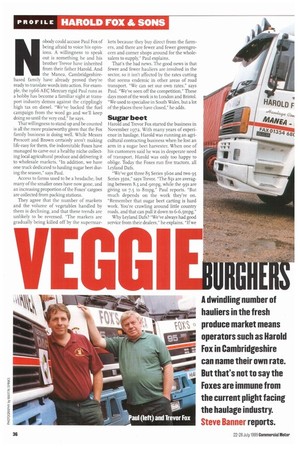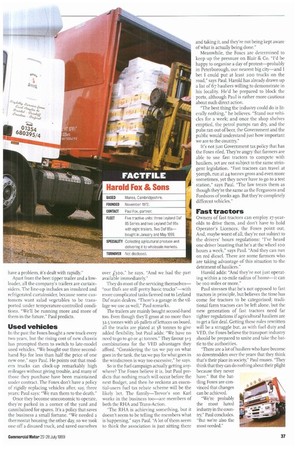N obody could accuse Paul Fox of being afraid to voice
Page 38

Page 39

If you've noticed an error in this article please click here to report it so we can fix it.
his opinions. A willingness to speak out is something he and his brother Trevor have inherited from their father Harold. And the Manea, Cambridgeshirebased family have already proved they're ready to translate words into action. For example, the 1966 AEC Mercury rigid Paul runs as a hobby has become a familiar sight at transport industry demos against the cripplingly high tax on diesel. "We've backed the fuel campaign from the word go and we'll keep doing so until the very end," he says.
That willingness to standup and be counted is all the more praiseworthy given that the Fox family business is doing well. While Messrs Prescott and Brown certainly aren't making life easy for them, the indomitable Foxes have managed to carve out a healthy niche collecting local agricultural produce and delivering it to wholesale markets. "In addition, we have one truck dedicated to hauling sugar beet during the season," says Paul.
Access to farms used to be a headache, but many of the smaller ones have now gone, and an increasing proportion of the Foxes' cargoes are collected from packing stations.
They agree that the number of markets and the volume of vegetables handled by them is declining, and that these trends are unlikely to be reversed. "The markets are gradually being killed off by the supermar
kets because they buy direct from the farmers, and there are fewer and fewer greengrocers and corner shops around for the wholesalers to supply," Paul explains.
That's the bad news. The good news is that fewer and fewer hauliers are involved in the sector, so it isn't affected by the rates cutting that seems endemic in other areas of road transport. "We can set our own rates," says Paul. "We've seen off the competition." These days most of the work is to London and Bristol. "We used to specialise in South Wales, but a lot of the places there have closed," he adds.
Sugar beet
Harold and Trevor Fox started the business in November 1972. With many years of experience in haulage, Harold was running an agricultural contracting business when he lost an arm in a sugar beet harvester, When one of his customers said he was in desperate need of transport, Harold was only too happy to oblige. Today the Foxes run five tractors, all Leyland Dafs.
"We've got three 85 Series 360s and two 95 Series 35os," says Trevor. "The 85s are averaging between 8.5 and 9rnpg, while the 95s are giving us 7.5 to 8mpg," Paul reports. "But much depends on the work they're on. "Remember that sugar beet carting is hard work. You're crawling around little country roads, and that can pull it down to 6-6.5mpg."
Why Leyland Dafs? "We've always had good service from their dealers," he explains. "If we have a problem, its dealt with rapidly."
Apart from the beet tipper trailer and a lowloader, all the company's trailers are curtainsi ders. The line-up includes an insulated and refrigerated curtainsider, because some customers want salad vegetables to be transported under temperature-controlled conditions. "We'll be running more and more of them in the future," Paul predicts.
Used vehicles
In the past the Foxes bought a new truck every two years, but the rising cost of new chassis has prompted them to switch to late-model used vehicles. "We bought our three secondhand 85s for less than half the price of one new one," says Paul. He points out that modern trucks can clock-up remarkably high mileages without giving trouble, and many of those they purchase have been maintained under contract. The Foxes don't have a policy of rigidly replacing vehicles after, say, three years; Paul says: "We run them to the death."
Once they become uneconomic to operate, they're parked in a corner of the yard and cannibalised for spares. It's a policy that saves the business a small fortune. "We needed a thermostat housing the other day, so we took one off a disused truck, and saved ourselves over f300," he says. "And we had the part available immediately."
They do most of the servicing themselves— "our Dais are still pretty basic trucks"—with more complicated tasks farmed out to Leyland Daf main dealers. "There's a garage in the village we use as well," Paul remarks.
The trailers are mainly bought second-hand too. Even though they'll gross at no more than 32.5 tonnes with 26 pallets of lettuces on board, all the trucks are plated at 38 tonnes to give added flexibility, but Paul adds: "We have no need to go to 40 or 41 ion nes." They favour 3+3 combinations for the VED advantages they afford. "Considering the tax we pay on what goes in the tank, the tax we pay for what goes in the windscreen is way too excessive," he says.
So is the fuel campaign actually getting anywhere? The Foxes believe it is, but Paul predicts that nothing much will occur before the next Budget, and then he reckons an essential-users fuel tax rebate scheme will be the likely bet. The family—Trevor's son Karl works in the business too—are members of both the RHA and Trans-Action.
"The RH A is achieving something, but it doesn't seem to be telling the members what is happening," says Paul. "A lot of them seem to think the association is just sitting there
and taking it, and they're not being kept aware of what is actually being done."
Meanwhile, the Foxes are determined to keep up the pressure on Blair 8c. Co. "I'd be happy to organise a day of protest—probably in Peterborough, our nearest big city—and I bet I could put at least 200 trucks on the road," says Paul. Harold has already drawn up a list of 67 hauliers willing to demonstrate in his locality. He'd be prepared to block the ports, although Paul is rather more cautious about such direct action.
"The best thing the industry could do is literally nothing," he believes. "Stand our vehicles for a week; and once the shop shelves emptied, the petrol pumps ran dry, and the pubs ran out of beer, the Government and the public would understand just how important we are to the country,"
It's not just Government tax policy that has the Foxes riled. They're angry that farmers are able to use fast tractors to compete with hauliers, yet are not subject to the same stringent legislation. "Fast tractors can travel at 50mph, run at 24 tonnes gross and even more sometimes, yet they never have to go to a test station," says Paul. "The law treats them as ibough they're the same as the Ferguson s and Fordsons of yanks ago. But they're completely different vehicles."
Fast tractors
Owners of fast tractors can employ 17-yearolds to drive them, and don't have to hold Operator's Licences, the Foxes point out. And, maybe worst of all, they're not subject to the drivers' hours regulations: "I've heard one driver boasting that he's at the wheel too hours a week," says Paul. "And they can run on red diesel. There are some farmers who are taking advantage of this situation to the detriment of hauliers."
Harold adds: "And they're not just operating within a to-mile radius of home—it can be too miles or more."
Paul stresses that he's not opposed to fast tractors in principle, but believes the time has come for tractors to be categorised; traditional farm tractors can be left alone, but the new generation of fast tractors need far tighter regulations if agricultural hauliers are to get a fair deal. Getting these rules rewritten will be a struggle but, as with fuel duty and V ED, the Foxes believe the transport industry should be prepared to unite and take the battle to the authorities.
"There are a lot of hauliers who have become so downtrodden over the years that they think that's their place in society" Paul muses. "They think that they can do nothing about their plight because they never have." But the batding Foxes are convinced that changes can be achieved.
"We're probably the most hated industry in the country," Paul concludes. "But we're also the most needed."








































































































